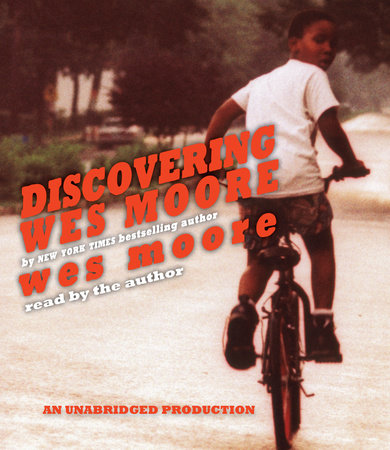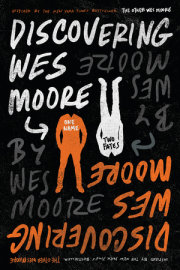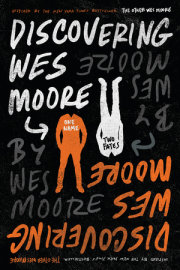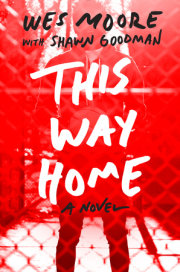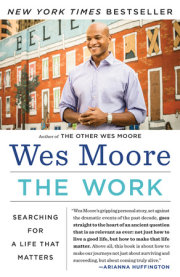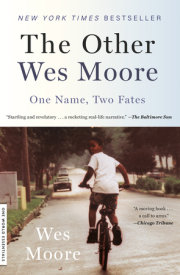Nikki and I were chasing each other around the living room. Every time she caught me I’d scream, but I loved every second. I was three. For every step her nine-year-old legs took, my little legs had to take four. It wasn’t easy to catch up. Then, for the first time ever, I caught her in my grasp. But I had no idea what to do. So, in the spirit of three-year-old boys everywhere who’ve run out of better ideas, I punched her, laughing hysterically. My mother had a radar for mischief. She walked into the room right as my swing connected with Nikki’s arm.
“Get up to your damn room!” Her yell startled me. “I told you, don’t you ever put your hands on a woman!”
My mother has hands that hit so hard you only have to feel them across your face once to know you don’t want them striking there again. I darted up the stairs to my room before those hands could reach me. If I hid myself, maybe I wouldn’t get punished. I slammed the door shut behind me just as her voice reached the second floor. “And don’t let me hear you slam that—” Boom! I stared at the closed door, knowing it would soon be flying open again. I sat there in silence in the middle of the tiny room I shared with my baby sister Shani. I wasn’t even sure why I was in so much trouble.
“Joy, you can’t get on him like that.” My father’s baritone voice drifted up through the thin floor. “He’s only three. He won’t even understand what he did wrong. You really think he knows what a woman beater is?” It wasn’t his style to yell. He stood six foot two, and he was thin, with a bushy mustache and a neatly trimmed Afro.
“Wes, he needs to learn what is good behavior and what is not!” my mom responded.
I heard my father’s gentle laugh. “Cursing at him isn’t the most effective way of making that point.”
My parents’ words faded into the background as I stared out the window, which overlooked a street in our busy neighborhood. On the dresser by the window sat a framed picture of Nikki and me. Colorful beads capped her braids—a hairdo she shared with my mother—and large, black-framed eyeglasses covered half of her face. I sat on her lap with my arm wrapped around her neck, a goofy smile on my face.
My full name is Westley Watende Omari Moore. My first name, Westley, is my father’s. As for my middle names, my father loved the sound and meaning of watende, a Shona word that means “revenge will not be sought.” It fit with his gentle, forgiving spirit. My mother thought Watende sounded too big and complicated for a tiny baby. She wanted to call me Omari, which means “the highest.” I’m not sure what was less complicated or soaring about that name, but they compromised by giving me both.
Nikki’s real name is Joy, like my mom’s, but at a young age she was nicknamed after Nikki Giovanni, my mom’s favorite poet. Mom was inspired by Nikki Giovanni’s feminine strength, and she wanted to teach my sisters and me about Giovanni’s message of tender love and fierce revolution.
I spent nearly every waking moment near Nikki, following her around as we teased each other. I couldn’t understand what boundary I had broken in our game. This wasn’t really a woman I was punching, anyway. This was Nikki. She was a comrade. Our bond was so close it was like we were one being. I thought there was no risk of offending her.
Years would pass before I understood how that blow connected to my mom’s past.
•••
My mother, Joy, came to the United States at the age of three. She was born in Lowe River, in the farmlands of Jamaica. Quiet Lowe River was far away from the tourist attractions along the coast. My mother’s grandparents, my great-grandparents, were called Mas Fred and Miss Ros. They lived on land that had belonged to our ancestors for generations. But my grandfather dreamed of studying theology in a university in America. When the family finally earned enough money, they moved to New York.
Settling into the Bronx took effort for Joy, but she jumped into the melting pot with both feet. She studied the kids at school like an anthropologist, quietly observing their accents and their style. She imitated voices she heard on the radio, tailoring her speech to fit her surroundings. The Jamaican word “irie” became “cool.” “Constable” became “policeman.” “Easy-nuh” became “chill out.” The melodic fluidity of the Jamaican accent gave way to the crisper diction of American English.
Joy entered American University (AU) in Washington, D.C., in 1968. It was a year marked by change, excitement, and tragedy throughout the world. In America, people were protesting the Vietnam War and marching in the civil rights movement in the name of peace and desegregation. The nation was divided. When Dr. Martin Luther King Jr. was assassinated, American cities exploded in riots. The riots were about more than King’s murder, though. They were about years of racial segregation and economic inequality that were reaching a breaking point. Being quiet was no longer an option. People took to the streets to express their rage. They were so overcome by feelings of frustration and hurt that they were burning down their own neighborhoods. In many areas, people in white neighborhoods blockaded their streets, trying to keep the damage within the poorer, black areas. By the time the riots stopped, our nation’s inner cities stood eerily quiet. To this day there are parts of our country that have not fully recovered.
Joy was furious that America, the very country that offered her new opportunities, still had laws and traditions that allowed her, as an African American and a woman, to be treated like a second-class citizen. She found support with her friends and fellow students in a campus group called OASATAU, the Organization of African and African American Students at the American University. OASATAU encouraged AU’s black students to take an active interest in national, international, and campus issues. Being around students with similar ideas raised my mother’s awareness—and her standards. She didn’t want to change to fit into the melting pot; she wanted to be accepted for who she was.
The treasurer of OASATAU was a junior named Bill. Two months after he and my mom met, they were engaged. Two years later, they married. Bill looked for work while Joy was a junior in college. They were both still trying to find their feet as adults, though, and being responsible for each other overwhelmed them. The love haze wore off sooner than they had expected. The same qualities that had made Bill so attractive as a college boyfriend—his free and rebellious spirit, his fierce contempt for “the Man”—made him completely unreliable as a husband. He had long been an occasional drug user, but now he started using drugs daily. Joy knew that free love and drug experimentation were part of being young in the 1970s, but she didn’t like them being constants in her own home.
As the years passed, Joy kept hoping that Bill’s use of alcohol and drugs would stop. She believed that her fantasy could come true—that she could change and save her man. When Nikki was born, Joy expected that Bill would be motivated to cope with his addictions and step up as a dad. But instead his addictions got worse, and the physical and emotional abuse he inflicted on Joy intensified dramatically.
One night, Bill came home higher than Joy had ever seen him.
“Wash the dishes!” he shouted. He was kicking doors and cabinets shut, slamming glasses down on the table.
“Shush,” she pleaded, “you’ll wake Nikki.”
The more she shushed him, the more he hollered. He moved in on her so that the two of them stood face to face. He grabbed her shoulders and threw her down. She was sprawled on the floor in her blue American University sweatpants, in agony, and before she could sit up, he grabbed her T-shirt and hair and dragged her toward the kitchen. She screamed without fear of waking Nikki anymore. He hit her in the chest and stomach. She kicked and scratched at his hands. He dragged her more roughly across the floor until her head slammed against the doorjamb. He released his grip on her hair and once again bellowed, “Wash the dishes!” He stood over her with a contemptuous scowl on his face. That look was the last straw. His abuse and humiliation were ruining the happy life Joy wanted for her daughter. Her will gave her the strength to pull herself up from the floor. On top of the counter was a wooden block that held all the large, sharp knives in the kitchen. She pulled the biggest one out and angled the blade at his throat. Her voice was collected: “If you try that again, it will be the last thing you ever do.”
Bill seemed to suddenly become sober. He backed out of the kitchen slowly, not taking his eyes from his wife’s tearstained face, her determined stare. A month later, Joy and Nikki left Bill for good. My mom vowed to never let another man put his hands on her.
Copyright © 2012 by Wes Moore. All rights reserved. No part of this excerpt may be reproduced or reprinted without permission in writing from the publisher.

